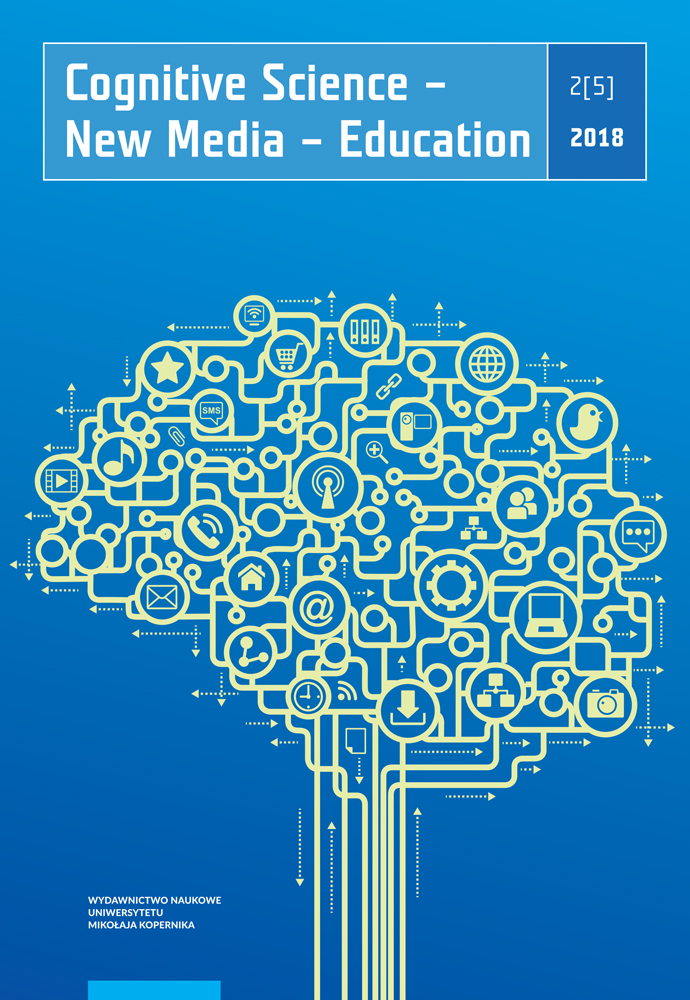Theoretical aspects of media education. New technologies as the creative and innovative conditio sine qua non
DOI:
https://doi.org/10.12775/CSNME.2018.009Keywords
communication, knowledge, media education, creation, innovation, new technologies, media (il)literacy, motivation, ethics, social media, advertising, pedagogy, didactics, educational authoritiesAbstract
Understanding the media education, and education in large, in the World of XXI century is closely connected with a new technologies and advantages and disadvantages which it brings along. Sometimes, we have a serious feeling that the speed of development of the new technologies is much faster than adjusting of the media education to it. A lot of reasons are connected with that: way of communicating (how to communicate interaction of media education with new technologies) with pupils and/or students (knowledge and the skills of the youngsters and/or youth about new technologies are sometimes higher and more comprehensive than the knowledge and the skills of the teachers and professors); media (il)literacy; lack of understandings from the educational authorities (or lack of their education about it as well) about the importance of linking media education and new technologies in the post-modern world; lack of creativity by the teachers in regards adequate presentation of the importance of connecting and interacting of media education with new technologies and vice versa, although it is also connected with the motivation connected with a position of the teachers within the society – underlining the social position of the teachers and/or professors and as well the ethical issues connected with the ways of the modules of communication; lack of innovations related to the way of linking of media education with new technologies – social media as a model of deliberative democracy within the process of media education and a lack of knowledge about the advertising the connection between media education and new technologies – the art of persuasion. This paper will show also the disadvantages of new technologies within the process of media education, especially if not used in pedagogical and didactic methodical way of the interaction of media education and new technologies to understand it as a “software” and an “hardware” of the creative and innovative world of humanity of the XXI century.
References
Amelung C. (2007), Using social context and elearner identity as a framework for an e-learning notification system, “International Journal on E-Learning”, 6(4), 501–517.
Bowman S. (2009), Presence, identity, and the cloud of knowing. E-learning, politics and society, “Journal of Moray House School of Education”, 1-7.
Cakir M. (2008), Constructivist approaches to learning in science and their implications for science pedagogy: A literature review, “International Journal of Environmental and Science Education”, 3(4), 193–206.
Carolyn B. & Foster C. (2010), Alternative certification: An effective model of online supported teacher education [in:] D. Gibson & B. Dodge (Eds.), Society for Information Technology & Teacher Education International Conference 2010, (pp. 17-32). Chesapeake, VA: AACE.
Cohen P. et al. (2010), Roadmap for education technology. Global Resources for Online Education, a project sponsored by the National Science Foundation and the Computing Community Consortium. Tempe, Arizona
Dede C. (2011), Emerging technologies, ubiquitous learning, and educational transformation. towards ubiquitous learning. Proceedings of 6th European Conference of Technology Enhanced Learning, EC-TEL 2011, Palermo, Italy, September 20-23, 2011.
Fazal M., DeSimone J. & Lieman L. (2010), Involving pre-service school leaders and teachers in assessing pilot electronic portfolio implementation [in:] D. Gibson & B. Dodge (Eds.), Proceedings of Society for Information Technology & Teacher Education International Conference 2010, (pp. 63-65). Chesapeake, VA: AACE.
Floridi L. (2011), The informational nature of personal identity, “Minds and Machines”, 21(4), 549–566. doi:10.1007/s11023-011-9259-6.
Graf S. & Kinshuk (2008), Adaptivity and personalization in ubiquitous learning systems [in:] A. Holzinger (Ed.), USAB, LNCS 5298, (pp. 331–338). Berlin, Germany: Springer-Verlag.
Hadžialić S. (2018), Social media and social innovation. Proceedings paper of the XIII International Scientific On-line Conference „Knowledge-Media-Education“, Nicolaus Copernicus University, Torun, Poland, Jun 2017 published in May 2018 in “Cognitive science - New media - Education” – reviewed, e-journal (Vol 2, No1, 2017, Pages. 33-56, ISSN: 2543-506X, May 2018)
Hadžialić S (2017), Paper: “Demagogy of the media: information or manipulation”, an International Journal of Ideas – Approved Journal in Social Sciences, Published by Babuddin Khan, New Delhi, India, ISSN 0970 7247, Volume 31, No 370, July 2016, Pages 22-29 (I part).
Hadžialić S. (2016), Paper: “Transformation of the New Communication Media within the Frame of Interpersonal Interaction”, International Journal on Global Business Management and Research, a Bi _ Annual Journal published by Rajalakhsmi Institutions, Tamilnadu, India, ISSN 2278 8425, Volume 5, Issue 2, August 2016, Pages 116-134.
Hadžialić S. (2016), Paper: “Perspectives on social media and Social innovations”, an International Journal of Ideas – Approved Journal in Social Sciences, Published by Babuddin Khan, New Delhi, India, ISSN 0970 7247, Volume 30, No 353, July 2016, Pages 23-27.
Harel I. & Papert S. (1991), Constructionism, Ablex Publishing.
Ke F., Chávez, A. F., Causarano P.-N. L. & Causarano, A. (2011), Identity presence and knowledge building: Joint emergence in online learning environments?, “International Journal of Computer-Supported Collaborative Learning”, 6(3), 349–370. doi:10.1007/s11412-011-9114-z
Papert S. (1980), Mindstorms: Children, computers, and powerful ideas, New York, NY: Basic Books.
Rodogno, R. (2011), Personal identity online, “Special Issue in Journal of Philosophy & Technology”, 24. Netherlands: Springer.
Satyanarayanan M., Bahl P., Caceres R. & Davies N. (2009), The case for VM-based cloudlets in mobile computing, “Pervasive Computing”, 8(4), 14–22. doi:10.1109/MPRV.2009.82
Shute V. J., Zapata D., Kuntz D., Levy R., Baker R., Beck, J. & Christopher R. (2009), Assessment: A vision. Global Resources for Online Education, a project sponsored by the National Science Foundation and the Computing Community Consortium, Tempe, Arizona
Sultan N. (2010), Cloud computing for education: A new dawn?, “International Journal of Information Management”, 30, 109–116. doi:10.1016/j. ijinfomgt.2009.09.004
Internet sources
Hadžialić S., Social media for summer semester 2018/2019, https://www.youtube.com/watch?v=cFOnMeJAs0c (access date: 11.5.2019).
Hadžialić S., Sabahudin Hadzialic - teaching session in Czernikowo, Poland, 27.3.2019, https://www.youtube.com/watch?v=ttaRs28NN7U (access date: 11.5.2019).
Sadler J. E., John Amos Comenius, Encyclopædia Britannica, https://www.britannica.com/biography/John-Amos-Comenius (access date: 10.5.2019).
Downloads
Published
How to Cite
Issue
Section
Stats
Number of views and downloads: 520
Number of citations: 0



